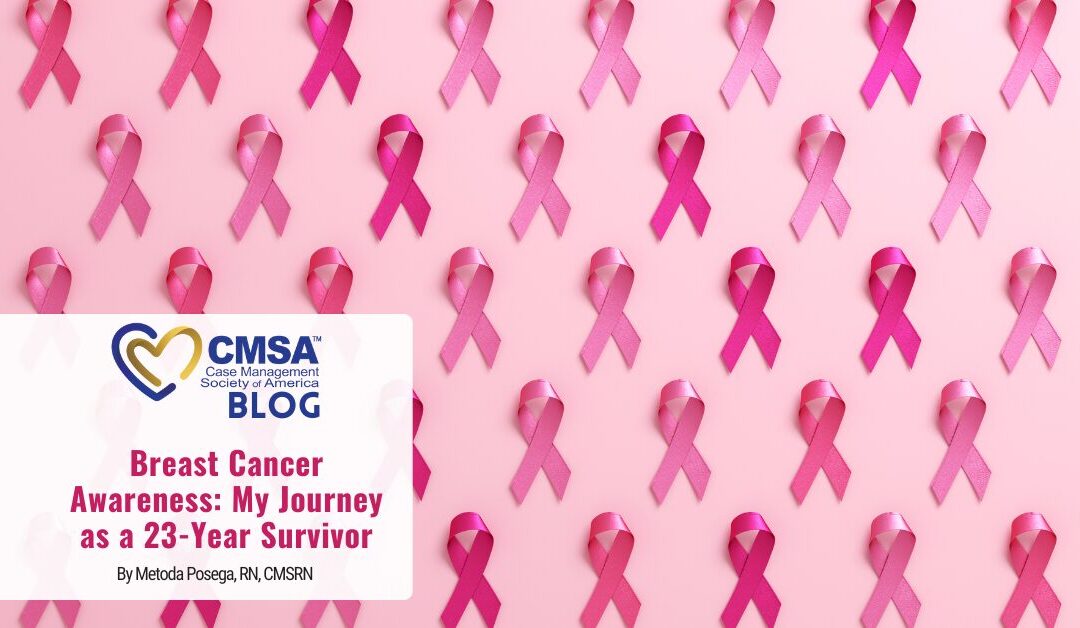By Metoda Posega RN, CMSRN
In October, Breast Cancer Awareness Month, we come together to raise awareness, support, and advocate for early detection and treatment. For me, this month holds an even more profound significance—it's a reminder of the battle I fought and the life I've been blessed with as a 23-year breast cancer survivor.
Almost Missed
My story began with a close call. Like many women, I did regular self-exams and went for screenings, but my cancer was nearly missed. One morning, I took a shower and looked in the mirror. I saw a lump. I wanted to ignore it, but I didn't. I called my PCP, and he ordered an ultrasound right away. The ultrasound did not show anything, and neither did the regular mammograms. My lucky day was that the radiologist questioned everything and ordered a compression mammogram. Bingo. Cancer was diagnosed. Lobular cancer. It's like smooth peanut butter vs chunky. If I did not have a great radiologist, my cancer would have been missed. I am forever grateful. From that point forward, That experience taught me the importance of advocating for yourself and pushing for thorough diagnostics when something feels off. It's easy to trust that routine tests will catch everything, but being proactive in your health can sometimes make all the difference.
The Decision for a Double Mastectomy
When I was diagnosed, I faced one of the most challenging decisions of my life—undergoing a double mastectomy. At that time, it felt like a drastic measure, but it was a decision made of a fierce will to survive. First, I had a lumpectomy, which means that my lump was removed. It was Friday and I had to wait until Monday for biopsy results. It felt like a lifetime. The surgeon said I needed to come to his office to discuss the results. I had the feeling that something was off. And it was. He said let's start with good news. The good news is that your lump is not cancerous. The bad news is that your cancer was right under the lump, and to explain in simple words, your cancer does not; it's smooth like peanut butter. If you didn't have that non-cancerous lump to guide you, perhaps we would not have found the cancer on time. What does this mean? To live my life in fear that smooth cancer will come back? Hell no! I wanted to live without fear. I can live without my natural breasts, but not with fear. My goal was to minimize the risk of recurrence as much as possible. It wasn't just about surviving cancer; it was about taking control of my future and doing everything in my power to protect it.
The Challenge of Chemotherapy
Chemotherapy followed, which brought its own set of challenges. The physical toll was harsh—nausea, hair loss, and fatigue were constant companions. But through it all, I found strength in my support system and a deep, inner resilience I didn't know I had. I did it for my two young children at the time—9 and nearly 16 years old. The journey was challenging, but it was also transformative. Each day, each treatment, brought me closer to the person I am today—a survivor. I had great support from my friends, family, and co-workers. I was so fortunate in this unfortunate situation.
The Importance of Awareness and Early Detection
I learned through my experience the critical importance of early detection. Breast cancer doesn't always present itself clearly. In my case, it was nearly missed, but persistence and advocating for my health with the help of my physicians helped lead to an early diagnosis. The earlier breast cancer is caught, the better the chances of successful treatment. That's why regular self-exams, mammograms, and doctor visits are vital, especially for women in high-risk categories.
Elevate your practice and advocate for inclusive, client-centered care—download the CMSA Standards of Practice for Case Management (2022) today, now featuring the newly released Standard Q: DEIB and Health Equity, introduced during #CMWeek2024!
click here: https://cmsa.org/about/standards-of-case-management-practice/
Bio: Metoda Posega RN CMSRN and Certified Codet is the Area Vice President Strategic Partnerships for Moments Hospice. She Metoda has been a nurse for nearly 40 years and has experience in different nursing specialties. From working on the hospital on medical surgical units, to working in the emergency room , ICU , post anesthesia care unit , to discharge planning, case management and marketing/business development for homecare and hospice. Hospice has been her passion now for over 25 years. She worked on hospice setting as a field case manager and was also in charge for inpatient level of Hospice Care at MacNeal hospital. Metoda loves educating on benefits of early hospice referrals and has conducted many in services on hospice care and safe discharge planning associated with end-of-life care at many area hospitals and nursing homes. She was also involved in teaching medical resident physicians and medical students. She is well known in the community for her knowledge of Hospice care with focus on quality of life at end-of-life. As a breast Cancer survivor, she is well aware of needs of the sickest and most vulnerable patients. While she worked for MacNeal Hospice, she was diagnosed with Breast Cancer and worked in between chemotherapy while providing comfort to patients in need.
The views and opinions expressed are those of the author and do not necessarily reflect those of CMSA.

